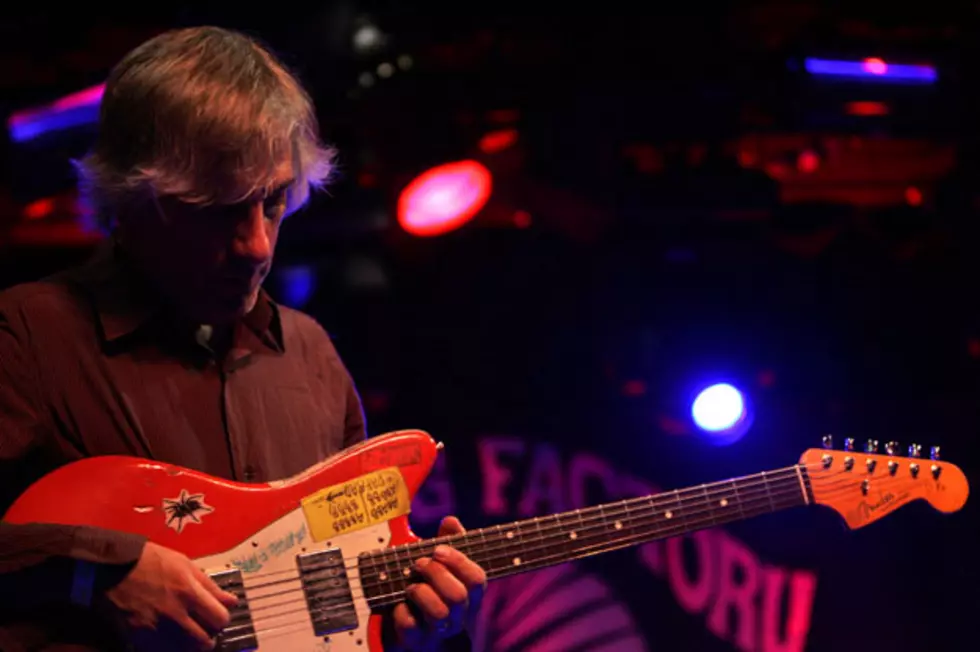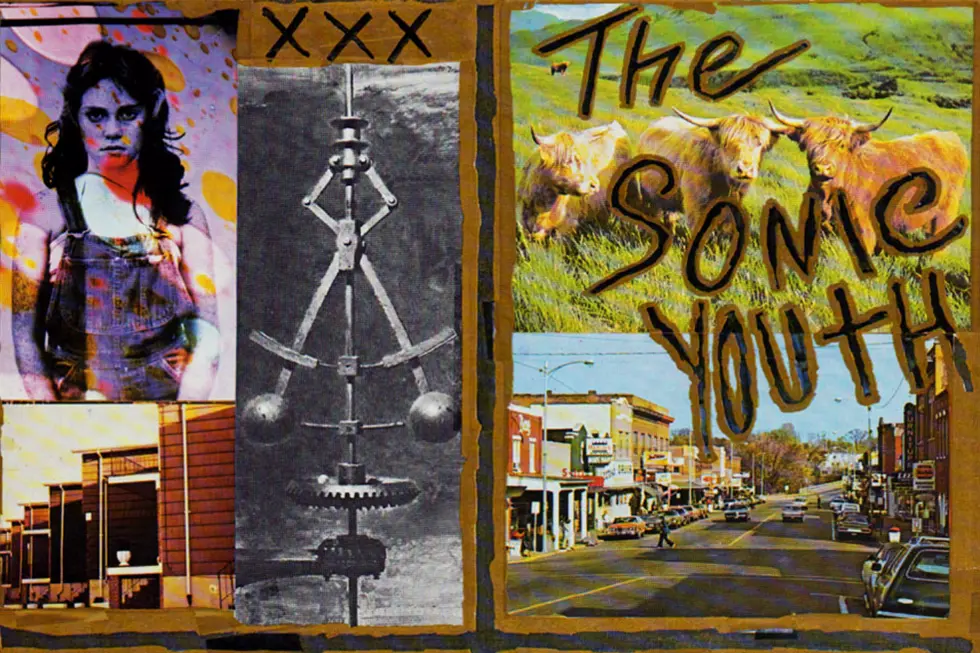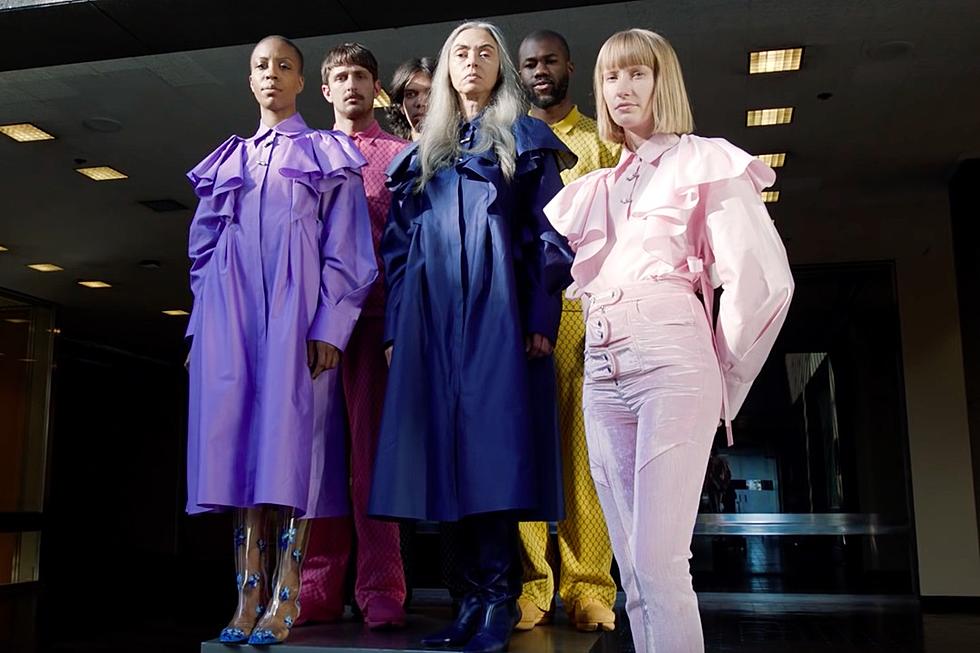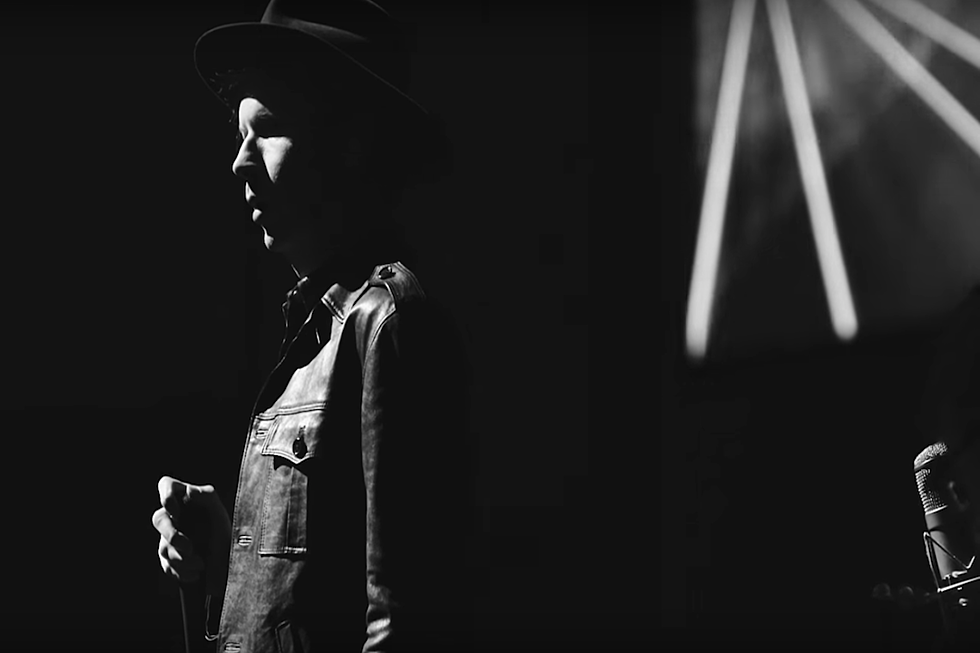
Lee Ranaldo Discusses New Solo Album, Spotify, the Future of Sonic Youth
Sonic Youth guitarist-singer Lee Ranaldo issued his first solo album, 'From Here to Infinity' -- extended guitar feedback drones recorded onto tape loops -- back in 1987, and has offered up about a dozen more in the years leading up to last month's release of 'Between the Tides and the Times.' Dubbed his debut solo effort by many publications, 'Tides' marks a transition from his experimental side to a singer-songwriter incarnation -- it is his first album of more standard rock fare. Yet, this being Lee Ranaldo, it's still anything but standard.
One of Ranaldo's first experiences as a New York musician came through performances with Glenn Branca, the avant garde composer known for conducting contemporary orchestras for up to 100 guitars in non-standard tunings. The aesthetic became central to the sound of Sonic Youth -- the band Ranaldo formed with singer-guitarist Thurston Moore and singer-bassist Kim Gordon in the early '80s (drummer Steve Shelley joined later) -- as they used open tunings and an ever-growing arsenal of hot-rodded guitars to sculpt a distinct sound. The band’s gradual evolution progressed from highly experimental (1983's 'Confusion is Sex') and structured chaos (1986's 'EVOL') to indie classic (1988's 'Daydream Nation') and alt-rock ruckus (1993's 'Dirty'), all the while exploring the overlap of extreme dissonance and haunting melody, freeform and song form.
Sonic Youth helped usher in the alternative rock movement of the '90s by mentoring bands such as Nirvana, Dinosaur Jr. and Babes in Toyland (all three appeared in their 1991 tour documentary ‘The Year Punk Broke’) culminating in a stint headlining a Lollapalooza 1995 festival bill that included Beck, Pavement and Hole. Since then they've embraced their roll as elder statesman of the alternative nation while unleashing the latest in an eclectic stream of discs every few years all the way up to 2009's 'The Eternal.' But it possibly all came crashing down with the shocking announcement last fall that Moore and Gordon had split after nearly three decades of marriage, throwing into question the future of Sonic Youth.
Ranaldo recruited several friends -- keyboardist John Medeski, Wilco guitarist Nils Cline and current and SY drummer Shelley and former bassist Jim O'Rourke -- to record Times,' which wanders between alternative, classic and folk-tinged rock with ease (check out the video for second single 'Angles' here). A live version dubbed the Lee Ranaldo Band will hit the road in May, supporting M. Ward on a two-week trip through the Northeast and the South that winds down with a single Midwest date on May 22 in Chicago, Ill. They also head overseas for a short stint that ends June 9 at the Optimus Prima Vera festival in Porto, Portugal. Ranaldo recently called up Diffuser.fm to discuss his new album, Spotify, Occupation Wall Street and the unknown future of Sonic Youth.
A lot of press has been calling this your first solo record, but you have a pretty deep solo catalogue. How did you approach this album differently than past releases?
I may be a party to that because in some ways it feels like it is my first solo record of this type anyway. I've obviously done tons of different records -- on my own mostly, usually more abstract and experimental, sometimes with a little singing -- but never a full-on record of songs I've written in this [way] before. So I don't know if it's my ninth, or 10th, or 12th, or 20th solo record, or my first.
How did it come about?
This record all started from a show I was invited to play in the spring of 2010 in the South of France. Someone that I know asked me to perform at this festival there and they specifically requested an acoustic guitar concert and as I was practicing for this concert, I thought I would just be playing a few [Sonic Youth] songs written over the years on acoustic. A new song popped out which I debuted there in France, and it just kind of started a writing process where I was just writing a lot of songs and they just kind of flowed after the other. In the early part of this record, I thought I was just going into the studio and making a solo acoustic voice record and it just slowly mutated and just sort of happened into organically what it became.
How was it different from writing and composing music with Sonic Youth?
I think the main difference is that Sonic Youth at [their] best is a real collective process -- we're writing songs in a very group-minded way, and our best material has always kind of been generated by us getting together in the studio and kicking ideas around. It was kind of a rarity in Sonic Youth that anybody would bring in an honest-to-God completed song and say kind of like, "this is how it goes, blah blah blah." It was always just more of a collective process, whereas this album is just more of it being a singer-songwriter kind of process where everybody that played on it is contributing a lot to the finished sound of the record, but the songs were developed by me in private and brought in as such.
Lyrically, time has always been a theme in your writing, from back to Sonic Youth's 'Pipeline/Kill Time' [from 1987's 'Sister'] to your new album. How does that play out on this album?
What is the concept of time?
Yeah, it's always seemed to be a big theme in your lyrics.
Even from the title of the new record, you know it's kind of this caught between the highly technological era we live in and the more slow paced natural world of past, present, and future. I guess it's just something I'm interested in looking at. On the one hand it's a way of looking at history and just trying to find one's own place in history ... to see the work that I've done and the work that Sonic Youth does in sort of a broader history of culture, to see my own life in regards to where I've come from, where I am now, and where I'm going. I just find that it's a really interesting thing to dwell on, you know the times we live in, where we come from, and where every thing's going.
You're known for your modified guitars. How do they influence your sound?
They augment our sound more than anything else -- with the electrics we've kind of modified them to the point where they really suit us over the years. I think the main modification that we do that's significant to our sound is working with a lot of these open tunings, I think that's really where the difference comes from. That's what I'm doing here and that's what's in Sonic Youth's music for sure. We're working with a lot of different alternate tunings that we're making up, it just kind of immediately takes the guitar out of this standard world and into sort of a new sound space, and it sets the music apart. That's always been in the case for Sonic Youth, it's been a major point in setting the music apart.
You photographed New York's Occupy Wall Street movement pretty extensively last fall. What do you take away from that and what do you think is going to happen this spring?
Well, I was really quite involved. I lived near Zuccotti Park and I was very enthusiastic about the movement and very much involved in it. I think that it's regrouping, I think that it's reformulating exactly what to do next and I think that whatever happens next is going to be an interesting extension of everything that happened last year. I think I don't even necessarily think it's fully in a dormant stage, I just think it's less visible now that there's no center point or there's no meeting point like Zuccotti was.
Zuccotti was a symbol of a genesis of the movement, but I think there's a lot of energy built up through the last year. It started in the Middle East and it spread from there to all around the world in a way with this kind of New Left, non-violent, mostly non-violent movement and I have great hopes that the voice of that movement is going to reemerge soon with good new ideas on how to shake the debate both nationally and internationally.
You're new album's is on Spotify, correct?
I think so, I haven't actually checked.
I think it was last time I checked. Patrick Carney from the Black Keys recently called one of the board members of Spotify an "a--hole ... [who] has $2 billion that he made from figuring out ways to steal royalties from artists." Do you think that Spotify is a feasible model?
I think that we're barely just on the cusp of this digital age and I think it's something that's being formulated as we speak and it's very much in progress. I think the idea of something like Spotify -- I mean I have problems with it on some level, mostly on the level of I miss holding the artwork in my hand and being able to pore over the notes and anything like that. On my record we took great care to include liner notes, a lot of information and lyrics and you don't get any of that on Spotify and that's kind of a drag to me.
But I do think that you can't fight progress and that this is kind of a part of our digital future that as Steve Shelly puts it, "the end of music ownership." You won't own a collection of records in your house anymore, you'll go to your computer and pull up whatever you want as though you're drawing from the largest library that ever existed. And the same thing is bound to happen with books and movies and everything else soon, so I think there's a lot to be worked out about artist rights and intellectual property rights and revenue for creators. Spotify may not be perfect right now, but I think that it's very much a progress and that at some point it will be some kind of equilibrium for each side.
You said Sonic Youth is on hiatus right now that's the best way you can honestly describe it. Is that something you decided as a band or is that just your own take and what do you think the future holds?
I have no idea what the future holds. There are so many ways in which we're all tied together to all these projects and different things and works right now there's so many ways in which we will continue to do stuff, I mean we've got archival projects in the works right now. As far as new recordings or new performances, it's anybody's guess.
There's a lot of sensitive personal issues being dealt with right now and none of us are really talking to each other about what the future might hold right now. We're on a hiatus because we decided we weren't going to do anything for a while after that last South American tour in light of everything that's happening, we're not even at a point amongst ourselves where we're starting to pick it up and try to discuss what might happen.
More From Diffuser.fm









